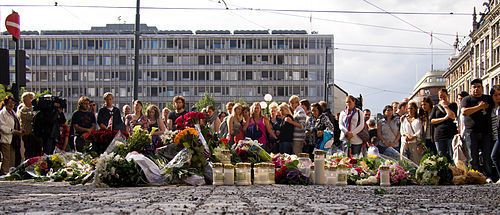The bomber isn’t one of “us”—and probably not one of “them,” either
NonProphet Status has been reflecting on the recent tragedy in Boston. We have a guest post today from reader and friend-of-the-blog, Andreas Rekdal, providing a compelling and unique perspective as a Norwegian reflecting on the 2011 Norway attacks as well as the events in Boston.

Oslo Cathedral the day after the attack (Photo credit: Wikipedia)
In his piece titled “A Muslim’s Prayer for the Boston Marathon,” Arsalan Iftikhar puts into writing the silent prayer he likely shares with millions of Muslims across the nation today: “Oh God…Please don’t let it be a Muslim…” Although I do not pray much anymore, I must admit that my first reaction was not all that different from Arsalan’s.
I vividly recall standing at a London airport on July 22nd 2011, reading the first updates about the bombing of a government building in the Norwegian capital. While frantically refreshing my phone’s browser, looking for more updates on the case, I could not help but notice the widespread consensus among commenters that Norwegians now found themselves confronted with the true face of Islam. At that moment, I was ashamed to be a member of a society in which it was considered acceptable to stoop so low as to make generalizations about the faith one fifth of the word subscribe to, based on the actions of only a few—who turned out to be just one and not be a Muslim at all.
The perpetrator more resembled the commenters than the imaginary “jihadists” they first pointed to. Anders Behring Breivik was an Islamophobic Norwegian nationalist acting in protest against the “Islamization” of his beloved home country. In order to make a statement against this islamization, he decided to bomb the Government Quarter before killing 69 young members of the political party he blamed for collaborating with the Muslims in the takeover.
As we learned more about him, he was written off as a disturbed and ill adjusted narcissist. He looked like a typical Norwegian, but we were sure to make it clear that the comparison ended there. We wanted nothing to do with him or his beliefs. He was not one of us.
As I am writing this, we have yet to hear reports regarding suspects in the Boston Marathon Bombing (apart from the New York Post’s ill-sourced reports about the suspect being a “Saudi national” which immediately went viral, but was shortly thereafter disconfirmed by the police). This has not stopped speculations of course, and again the general consensus in many circles seems to be that muslims are to blame. As Vlad Chituc notes in his excellent roundup and reflection on islamophobia in the light of this tragedy, these speculations “speak volumes of our biases.” Because let’s be honest: there is literally no reason, save prejudice, to suspect that the person or persons behind are of the Islamic faith.
We do not yet know who the bombers are. But if we do find out, we should keep in mind that it is unlikely that they can rightly be claimed as true representatives of any catch-all category, be it “liberal,” “conservative,” “Saudi,” “American,” “Christian,” or “Muslim.”
We Norwegians reserved the right to distinguish our views from Breivik’s, and Americans reserved the right to disown those of Timothy McVeigh. But when it comes to Islamic terrorists, we assume that their actions say something about Islam as a whole, and all of its adherents. Our prejudice has become so rampant that in lieu of evidence, our default response to acts of terror is to direct our suspicions toward the Muslim community.
Allow me to stress again that we do not yet know who the bombers are. But let me assure you that regardless of the bombers’ nationalities, ethnicities, or religious traditions, most of those who claim similar identities will probably be first in line to say that the bombers do not speak for them.
I think we should take their word for it.
 Hailing from the mild-wintered Norwegian west coast, Andreas braved the godforsaken tundra known to non-locals as “Minnesota” while obtaining his B.A. in political science and philosophy. After graduating in December 2012, Andreas went on to work for the Carnegie Council for Ethics in International Affairs, proving once and for all that a liberal arts degree is only almost useless. While in college, Andreas founded an organization called the Secular Student Community (which was recently approved!). On his spare time he enjoys talking theology in bars, and getting way too into Facebook discussions.
Hailing from the mild-wintered Norwegian west coast, Andreas braved the godforsaken tundra known to non-locals as “Minnesota” while obtaining his B.A. in political science and philosophy. After graduating in December 2012, Andreas went on to work for the Carnegie Council for Ethics in International Affairs, proving once and for all that a liberal arts degree is only almost useless. While in college, Andreas founded an organization called the Secular Student Community (which was recently approved!). On his spare time he enjoys talking theology in bars, and getting way too into Facebook discussions.



